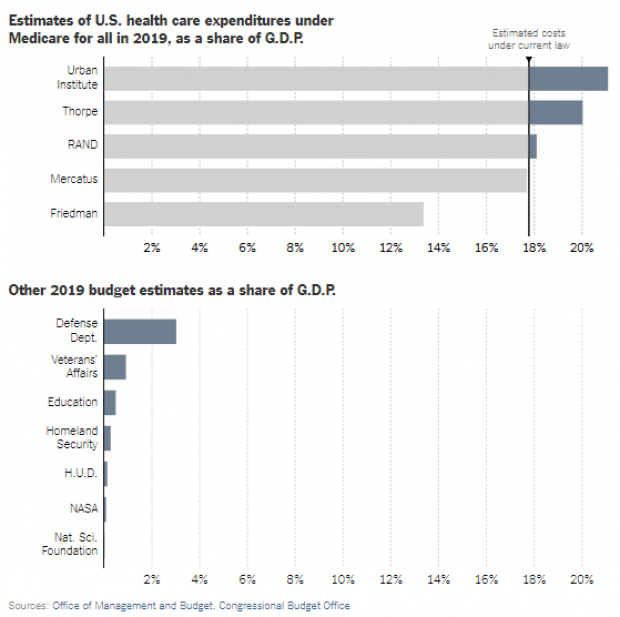Cost remains a central problem for universal health care, although there is little agreement about how much such plans would cost overall. Larry Levitt of the Kaiser Family Foundation said Wednesday that it’s important to keep an eye on the different components within the health care system when considering costs: “When you talk about the cost of Medicare-for-all, it’s important to be clear about whose cost you’re talking about -- the overall health care system, consumers and patients, or the federal government,” Levitt tweeted Wednesday.
Levitt went on to say, “Medicare-for-all would somewhat increase or decrease overall U.S. health spending, depending on the details of how it’s implemented and what assumptions you make. When you hear numbers in the trillions, remember we already spend trillions on health care.”
Supporters of universal health care argue that their plans would simply redirect funds that already being spent, potentially with little change to overall spending. In that vein, Sanders said that “Medicare for All does not represent any new spending at all. Instead, it represents a rebalance of how our current dollars are spent.”
Critics argue that providing generous health care benefits to millions of additional people would have to cost more, especially if cost-saving proposals don’t pan out, and Republicans are quick to attack universal health care plans as overly complex and unaffordable. “’Medicare for all’ is a euphemism for government takeover of healthcare, and it would increase wait times, eliminate choice, and raise taxes,” said Kayleigh McEnany, spokeswoman for President Trump’s re-election campaign.
Whatever the final cost, a universal health care system would necessarily involve a substantial increase in taxes as the government-run health care system turns to individuals and companies to cover the entire bill for health care, which currently comes in at $3.7 trillion overall, with private insurers picking up much of the tab. While Sanders provided some options for raising more tax revenues (see above), he said there still needs to be a “vigorous debate” over how to finance his plan.
Josh Katz, Kevin Quealy and Margot Sanger-Katz of The New York Times rounded up some of the leading Medicare for All cost estimates Wednesday, and found that the variation between them was enormous – larger than the cost of many government agencies. While the estimates aren’t exactly apples-to-apples, they do give a sense of the scale involved. Of the five estimates they reviewed, two showed net savings while three showed net increases in health care expenditures in the economy with the adoption of universal health care.
The chart below from the Times shows health care spending as a percentage of GDP under the five estimates, compared to the current level of roughly 18%. In the best case scenario, overall health care spending falls to less than 14% of the economy. In the worst, it rises to roughly 22%.




